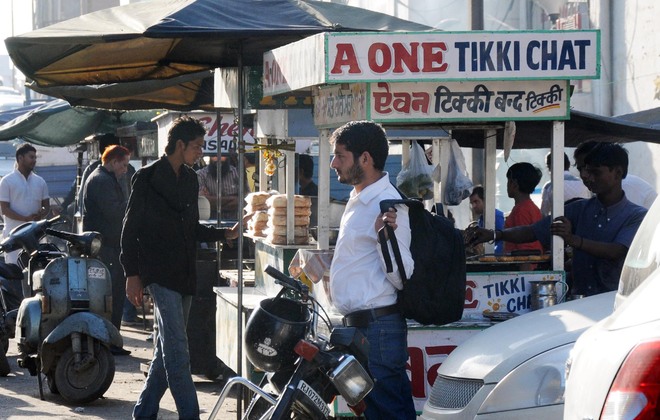Mar 18, 2020
E.coli lurking in B'luru street food, hotels no better
Cooked food also contaminated; study flags govt apathy
Favourite chicken momos and pani puri are teeming with harmful bacteria, including E.coli.
Indian street food vendors near the holy Ganges river. According to legends, Varanasi city was founded by God Shiva about 5000 years ago.
Bengaluru,
Your favourite chicken momos and pani puri are teeming with harmful bacteria, including E.coli.
As per a study, many popular snacks sold by street vendors in Bengaluru failed to clear safety tests, with lab reports of 50 samples showing the presence of harmful bacteria.
The results highlight the crisis in the unorganised sector that has faced government apathy for decades, while hotels — which are equally unhygienic — have remained impenetrable, thanks to a legal wrangle.
The study was the result of a collaboration between Mount Carmel Autonomous College and Ramaiah Advanced Testing Laboratory which highlighted the need for positive government intervention instead of periodical crackdown.
One sample each was collected as per FSSAI guidelines from 50 vendors spread across Koramangala, Vijayanagar, RT Nagar, Palace Guttahalli, Rajajingar, Wilson Garden, Shanti Nagar, Thippasandra, Vasanthnagar, Vyalikaval, Sudhama Nagar and Indiranagar.
Of the 25 samples of bhel puri, pani puri, masala puri and sukha puri, 14 had E.coli. Even cooked food like chicken was found to be contaminated. Of the six samples of chicken kebab and chicken momo, three had E.coli. The bacteria was also found in three of the five samosa samples.
Jubin Joseph, COO at Ramaiah Lab, said the presence of E.coli indicates water contamination. “The source is likely to be the water supplied to street vendors or the raw materials for the food they prepare, especially vegetables and chicken,” he said.
The public trusts darshinis and star hotels as there is no one testing their food. A senior official in the Food Safety and Standards Authority of India (FSSAI) said they have not checked the kitchens nor tested food from restaurants ever since the hotel owners’ association managed to get a stay from the court.
Process to register under Food Safety Act is all Greek to vendors
LUDHIANA: Vendors are finding it difficult to get themselves registered under the Food Safety and Standards Act, 2006.

It is mandatory for all those who are in food business, including owners of canteens and hotels, to obtain a licence under the Food Safety and Standards Act, 2006.
Ludhiana, March 21
Vendors are finding it difficult to get themselves registered under the Food Safety and Standards Act, 2006. The Suvidha Centre, which was to facilitate the vendors, has left them disappointed.
It is mandatory for all those who are in food business, including owners of canteens and hotels, to obtain a licence under the Food Safety and Standards Act, 2006.
Parkash, a migrant from Bihar and a roadside vendor, who has a tikki rehri at Chaura Bazar, said:
“I went to the office and they gave me a form, but I was unable to fill it. The form is lying with me. I will ask somebody to help me fill in the form and then submit it,” he said.
Roshan, who runs a juice corner near the bus stand, said: “I know getting registered is mandatory, but the government should simplify things for those who are unable to understand the complexities of paper work. I only know how to write my name and operating computer is beyond my ability. Nobody at the window is ready to fill in my form and I did not want to waste money on agents. A help desk should be set up at such centres to facilitate people like us,” he lamented.
District Health Officer Dr Abnash Kumar said the facility to help people fill in forms for getting registered under the Act was yet to start at the Suvidha Centre.
About registration
Petty retailers and hawkers with an annual turnover of Rs 12 lakh should get registered by paying the annual fee of Rs 100. Large scale units involved in dairy, vegetable oil processing, meat processing, food processing and exports whose turnover is above Rs 12 lakh should obtain licences. The registration is renewed every year.
Subscribe to:
Comments (Atom)








